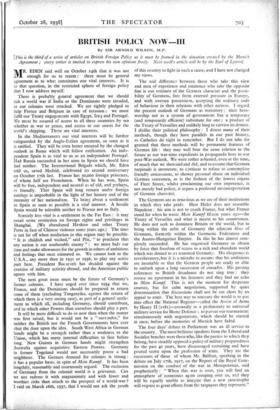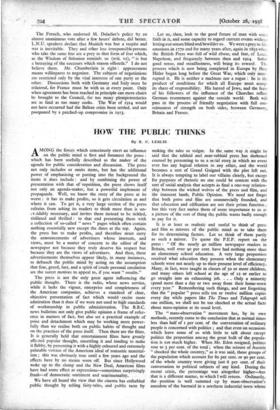BRITISH POLICY NOW HI
By SIR ARNOLD WILSON, M.P.
[This is the third of a series of articles on British Foreign Policy as it must be framed in the situation created by the Munich Agreement ; every writer is invited to express his own opinions freely. Next week's article will be by the Earl of Lytton] MR. EDEN said well on October 14th that it was not enough for us to rearm : there must be general agreement as to what constitutes our vital interests. It is to that question, in the restricted sphere of foreign policy that I now address myself.
There is probably general agreement that we should risk a world war if India or the Dominions were invaded, or our colonies were attacked. We are rightly pledged to help France and Belgium in case of invasion ; we must fulfil our Treaty engagements with Egypt, Iraq and Portugal.
We must be assured of access to all these countries by sea whether in war or peace, and access to our coasts for the world's shipping. These are vital interests. '
In the Mediterranean our vital interests will be further safeguarded by the Anglo-Italian agreement, so soon as it is ratified. They will be even better ensured by the changed outlook in Rome which will follow ratification. An inde- pendent Spain is as vital to us as an independent Portugal. Had Russia succeeded in her aims in Spain we should have had neither. The International Brigade which, Mr. Eden told us, saved Madrid, celebrated its second anniversary on October '7th last. Franco has 50,000 foreign prisoners, of whom half are Frenchmen. When he has won, Spain will be free, independent and neutral as of old, and perhaps, as friendly. That Spain will long remain under foreign tutelage is improbable in the light of her history and of the intensity of her nationalism. To bring about a settlement in Spain as soon as possible is a vital interest. A hostile Spain would be tolerable neither to France not to Italy.
Scarcely less vital is a settlement in the Far East : it may entail some restriction on foreign rights and privileges in Shanghai. (We abandoned Hankow and other Treaty Ports in face of Chinese violence some years ago.) The time is not far off when mediation in this region may be possible.
" It is childish and wicked," said Pitt, " to proclaim that any nation is our unalterable enemy " : we must bide our time and make allowances for the growth in others of ambitions and feelings that once animated us. We cannot look to the U.S.A., any more than in x931 or 1936, to play any active part here. President Rocsevelt has decided against the exercise of military activity abroad, and the American public agrees with him.
The next great issue must be the future of Germany's former colonies. I have urged ever since 1934 that we, France, and the Dominions should be prepared to return some of them (excluding Tanganyika, against the return of which there is a very strong case), as part of a general settle- ment to which all, including Germany, should contribute, and in which other Powers than ourselves should play a part. It will be more difficult to do so now than when the matter was first raised, but it would not be a " surrender," for neither the British nor the French Governments have ever shut the door upon the idea. South West Africa in German hands might be a strength rather than a weakness to the Union, _which has many internal difficulties to face before long. New Guinea in German hands might strengthen Australia against acquisitive Eastern Powers. Germany in former Togoland would not necessarily prove a bad neighbour. The German demand for colonies is strong : it has a popular basis, in spite of Mein Kampf. It has been lengthily, reasonably and courteously argued. The exclusion of Germany from the colonial world is a grievance. Can we not redress it with magnanimity and with fewer and worthier risks than attach to the prospect of a world-war ? I said on March 16th, 1937, that I would not ask the youth of this country to fight in such a cause, and I have not changed my views.
The real difference between those who take this view and men of experience and eminence who take the opposite line is our estimate of the German character and the possi- bility of Germans, free from external pressure in Europe, and with oversea possessions, accepting the ordinary code of behaviour in their relations with other nations. I regard the present outlook of Germans as transitory : their hero- worship not as a system of government but a temporary (and temporarily efficient) substitute for one ; a product of the Treaty of Versailles and unlikely long to survive its demise. I dislike their political philosophy : I detest many of their methods, though they have parallels in our past history, as Catholics do right to remember. But I do not take for granted that these methods will be permanent features of German life : they may well bear the same relation to the future as our war-time expedients in propaganda bore to our post-War outlook. We were rather ashamed, even at the time, of much that we then said and did, and to assume that German turpitude is inveterate, to continue to refuse to contemplate friendly concessions, to shower personal abuse on individual German statesmen, as is the fashion of the lowest organs of Fleet Street, whilst proclaiming our own impotence, is not merely bad policy, it argues a profound misinterpretation of German character.
The Germans are as tenacious as we are of their institutions in which they take pride. Herr Hitler does not resemble Napoleon : his aim is not to crash France, but what France stood for when he wrote Mein Kampf fifteen years ago—the Treaty of Versailles and what it meant to his countrymen. He does not seek to dominate Britain or the world, but to bring within the orbit of Germany the adjacent blocs of Germans, formerly within the Germanic Federation and the Austro-Hungarian Empire. In this he has almost com- pletely succeeded. He has organised Germany to obtain by force that freedom of access to a rich and abundant world which was denied to an unarmed Germany. His eloquence is reverberatory, but it is a mistake to assume that his ambitions are insatiable or that the German people are ready or able to embark upon a long succession of crusades. His passing references to British decadence do not ring true : they arouse no agreement in his listeners and they find no echo in Mein Kampf. This is not the moment for desperate courses, but for calm negotiation, supported by quiet determination that discussions shall not be cut short by an appeal to arms. The best way to reassure the world is to put into effect the National Register—called the Assize of Arms by Henry II (1180—avowedly as a preliminary to universal military service for Home Defence ; to pursue our rearmament simultaneously with negotiations, which should be started at once, before the memories of Munich have faded.
The four days' debate in Parliament was an ill service to the country. The most bellicose speakers from the Liberal and Socialist benches were those who, like the parties to which they belong, have steadily opposed a policy of military preparedness for the past 4o years, have discouraged recruiting and have poured -scorn upon the profession of arms. They are the successors of those of whom Mr. Balfour, speaking in the debate on July 17th, 1917, on the Report of the Royal Com- mission on the conduct of the war in Mesopotamia, said prophetically : " When this war is over, you will find an atmosphere of economics ag tin creeping over us, and they will be equally unable to imagine that a new catastrophe will require as great efforts from the taxpayers they represent." The French, who endorsed M. Daladier's policy by an almost unanimous vote after a few hours' debate, did better. L.N.U. speakers declare that Munich was but a respite and war is inevitable. They and other less irresponsible persons who take the same line are a prey to that form of fear which, as the Wisdom of Solomon reminds us (xvii. 12), " is but a betraying of the succours which reason offereth." I do not believe them. Mr. Chamberlain is right : appeasement means willingness to negotiate. The subjects of negotiations are restricted only by the vital interests of one party or the other. Discussions both with Germany and Italy must be trilateral, for France must be with us at every point. Only when agreement has been reached in principle can more chairs be brought to the Council, for too many plenipotentiaries are as fatal as too many cooks. The War of 1914 would not have occurred had the Balkan crisis been settled, and not postponed by a patched-up compromise in 1913. Let us, then, look to the good future of man with sou. faith in it, and some capacity to regard current events within letting our senses blind and bewilder us. We were a prey to ilk. emotions in 1770 and for many years after, again in 1852 whe the British Press was full of wild abuse, and fear, of Lou:: Napoleon, and frequently between then and 1914. Sober good sense, and steadfastness, will bring its reward. Th, process which is now being completed in Europe by Her Hitler began long before the Great War, which only inter- rupted it. He is neither a madman nor a rogue : he is the product of conditions for which all Europe must accept its share- of responsibility. His hatred of Jews, and the fears of his followers of the influence of the Churches reflect German resentment, against the outside world. Both will pass in the process of friendly negotiation with full con- sciousness of strength on both sides, between Germany, Britain and France.

























































 Previous page
Previous page